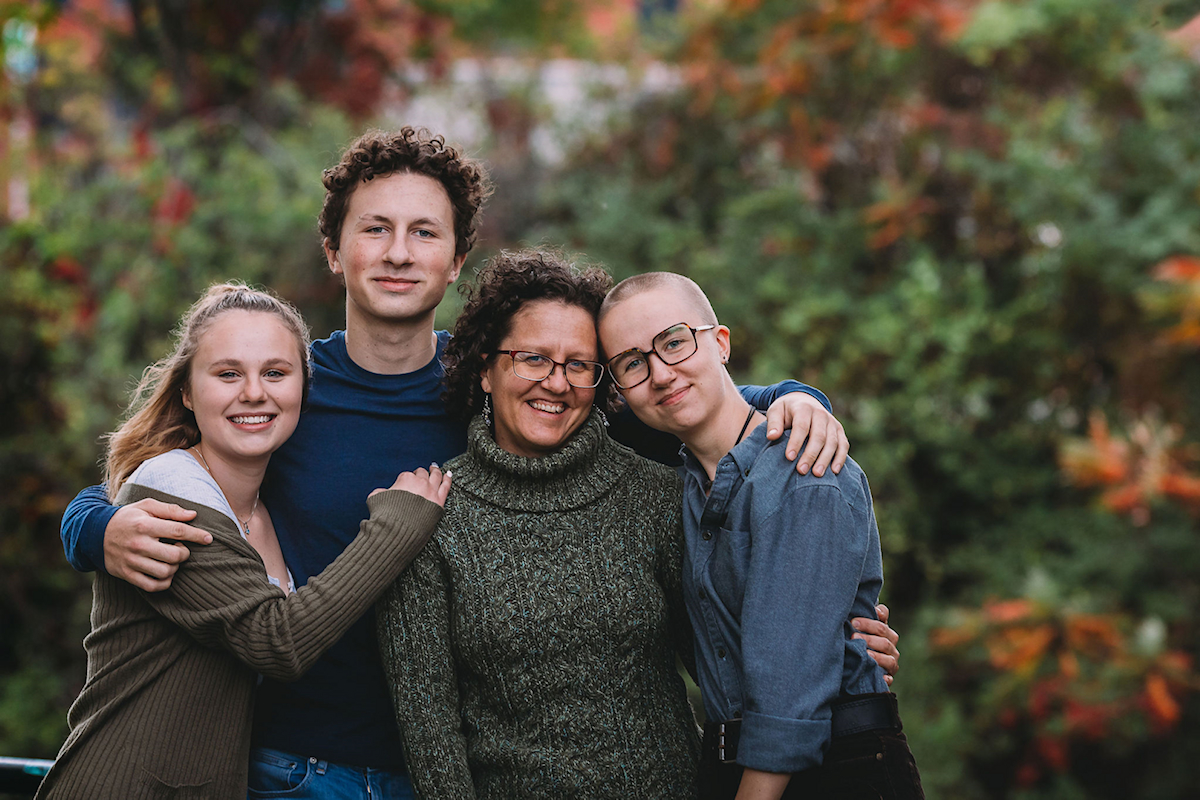Get posts by email
How motherhood changed my theology (Coming out as an affirming Christian)
January 7, 2021
I had a lot I wanted to say two years ago, when my young adult child Céline came out publicly as bisexual on National Coming Out Day.
Their announcement wasn’t a “coming out” to their close friends and family. That had already happened and I had the privilege and deepest honor of being their parental sounding board and safe space in the year or so prior to that day.
They came out on social media with a cross-stitch. (I adore their cleverness and creativity.) Which I shared to my own social media as a way of also coming out that I am an affirming Christian. A fact that I had hoped was assumed by many but that I hadn’t expressly articulated to friends and family.
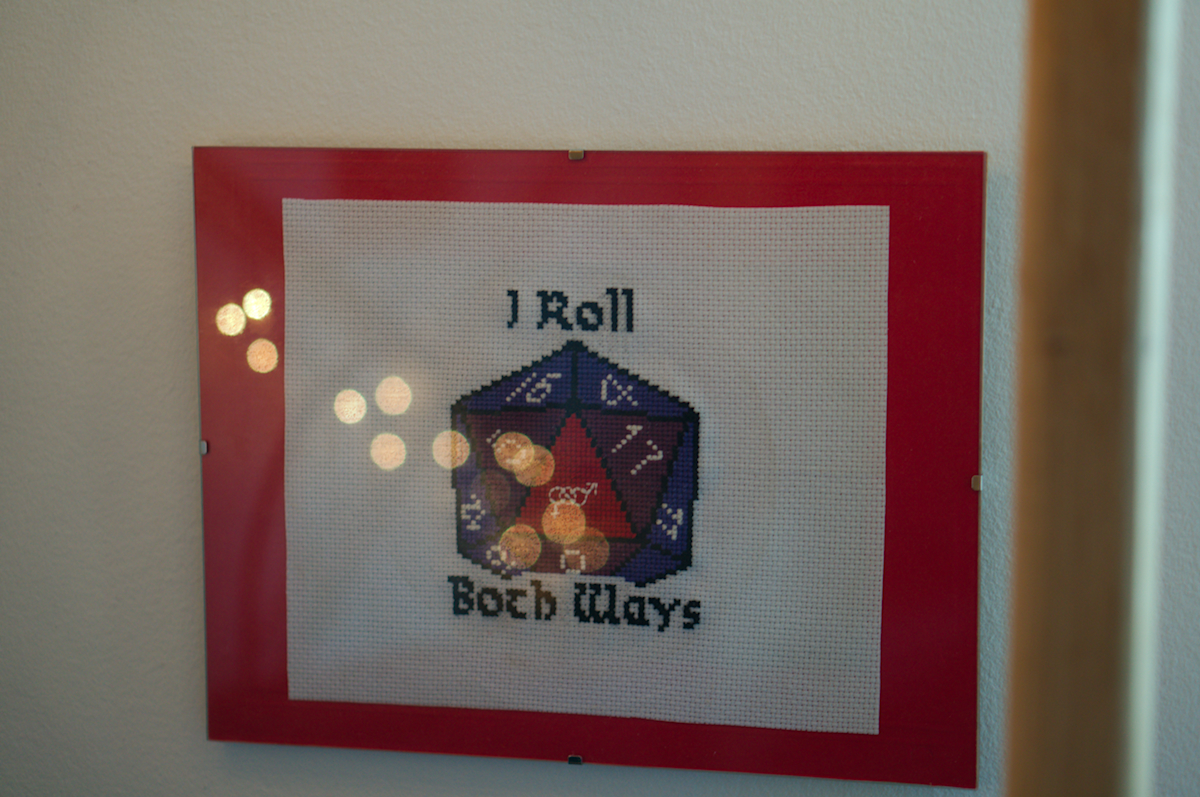
I had a lot I wanted to share about transformation in my own life but I didn’t have the words, the energy or even the desire to publicly process it all at that point. The explanation of one’s deepest beliefs is hard work and takes a lot of vulnerability. Especially when you know those ideas will be picked apart and scrutinized.
I appreciate intellectual rigour and examination of ideas. I appreciate vulnerability. But the Church, for many people, is the least safe place for these kinds of conversations.
I feel late to the party. Both in terms of my conversion to being an LGBTQ+ affirming Christian and in writing about that conversion. This has been happening on the fringes of evangelical Christianity for a while. But my own conversion has been in the last 5 or so years.
My familial and faith community cultures of origin do not recognize the full equality of LGBTQ+ folks. Marriage - off the table, full participation in the Church - same. In short, the places I come from, spiritually and culturally, have condemnation at worst and heteronormative concessions at best, for people like my child.
That’s the context from which I come and which I’m returning to in this post to unpack my own coming out as an affirming Christian.
The fact that your individual ideas, ideologies, religious beliefs and doctrines - all of it can change and grow - is one of the most redeeming qualities of human nature. I don’t know if you’ve noticed, but humans have believed some really dumb shit in the past. And not just dumb, but down right evil. And worse yet, lots of those beliefs were (and are) supported by religion.
Thank God we’re not stuck where we are. That our ideas, habits, and patterns are not immutable.
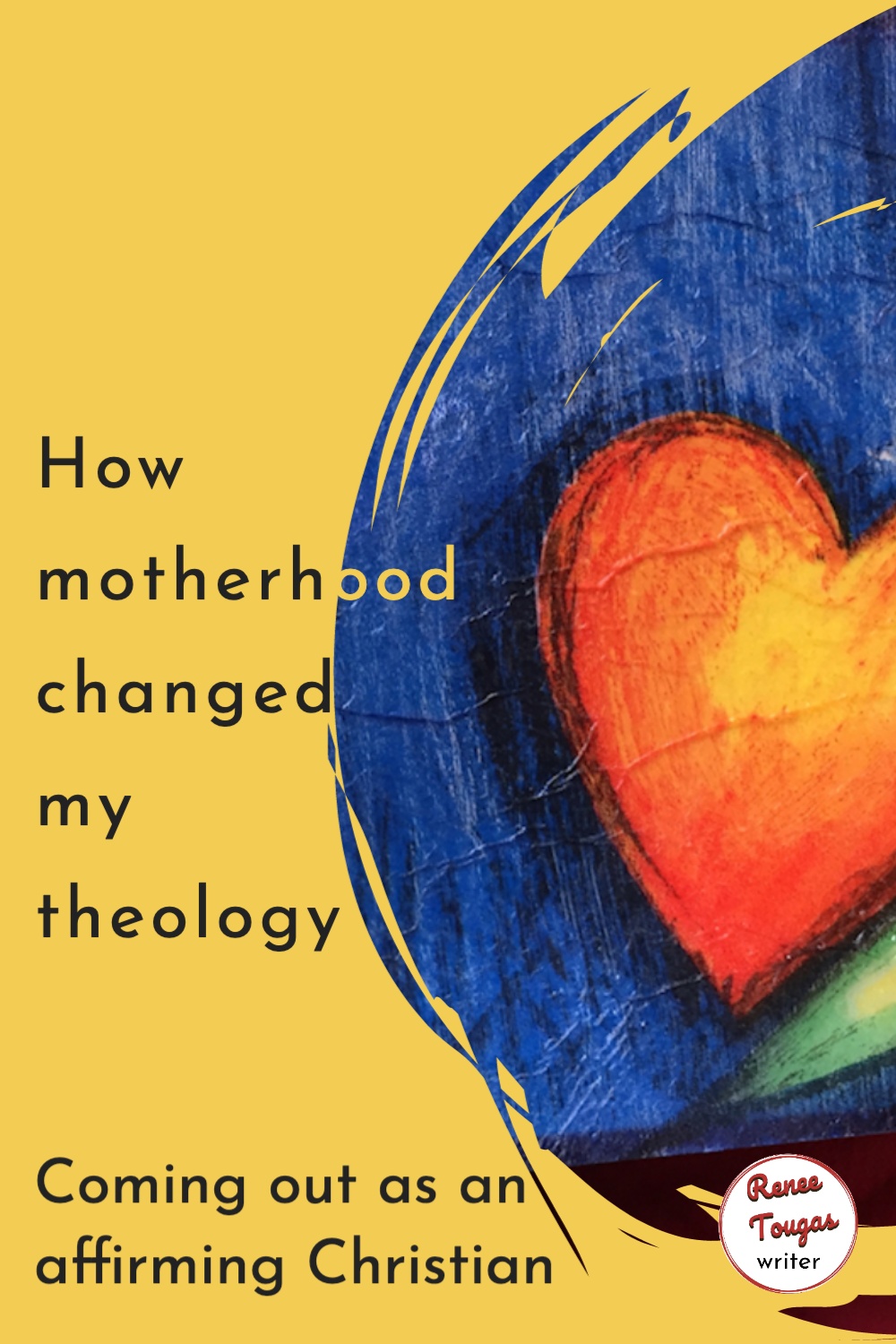
Spoiler alert: this is not a story about my queer young adult child. That story is not mine to tell.
This is a story in which I bear witness to the changes in my own faith because of the people I’ve met, my life experiences, and especially my lived reality as a mother.
There’s a reason good story telling often starts with “I was born in…”. You have to know where a person comes from to understand who they are now.
Where I come from is an evangelical expression of the Christian faith.
Except for charismatic worship, which still resonates with me (the bodily experience, not the lyrics) I was a terrible evangelical Christian. I loved Jesus but I never evangelized. I just could never muster excitement for the “good news” that:
- We’re fundamentally separated from God.
- We’re all destined to hell because of that.
- But… God killed his son so we don’t have to be separated from God.
- All we have to do is believe this, choose to follow Jesus and we’re saved, no longer separated from God.
When I realized in more recent years that:
- I actually didn’t believe this, and
- this was not the only way to understand the Christian faith
that’s when I started to become much more evangelical, talking more openly about my faith, and what to me is actually good news - God is as close as breath and is the ground in which we live, move and have being. We’re not separated, from God or each other.
That’s also when I left evangelicalism, but I’m getting way ahead of myself.
As I’ve talked about in this blog series on my faith, I carried a lot of spiritual and cognitive dissonance through my childhood, teens, and early adulthood that I papered over with a belief stronger than my unanswered questions. Somehow along with the message that people will be burning in a literal hell I was also taught, mostly by my loving family, that God is love and all will be sorted right in the end.
In my heart of hearts I did not believe that God would condemn most of humanity who had never claimed “belief” in Jesus to eternal torment. God got to play the ultimate “I’m God” trump card. And I believed that card was in our favour.
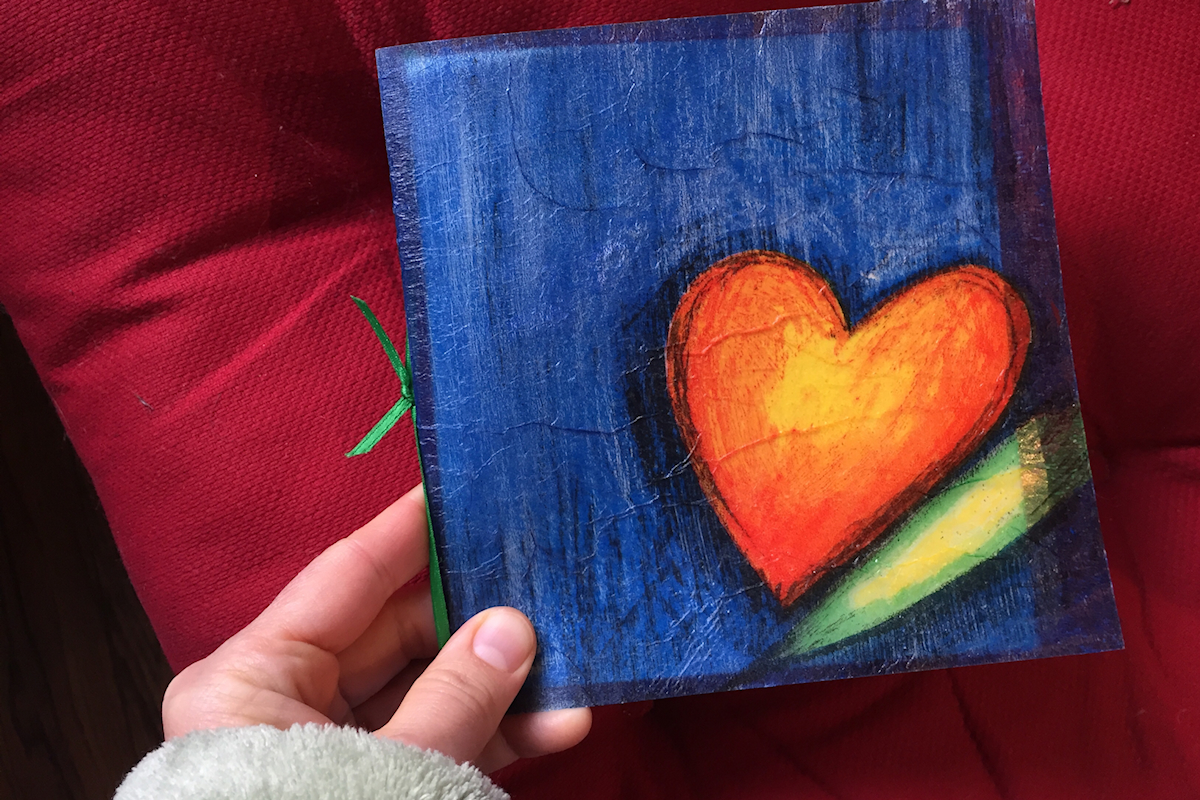
(I think part of my belief in this trump card is because if you truly believe all non-believers are going to hell it places such an inordinate burden on you to “get people saved”. I don’t think the psyche can handle that anymore than it can handle the extreme and gratuitous violence of eternal torment.)
How I fundamentally came away with the message that God is Love under such a vengeful religious framework is a testament to the actual love, connection and belonging I experienced in my life.
I belonged. I was loved. That was my foundation.
Coming from this background I’ve always found myself in an interesting position as a writer. For most of my blogging vocation (I’ve been publishing this blog for 16+ years) I didn’t explicitly write out my beliefs. I’ve never hid my Christian faith but I never spelled it out either.
Spelling out one’s beliefs is very hard and I wouldn’t compel anyone to do it. The best way to evaluate what someone believes is to look at how they live. Our beliefs are evident in our actions.
It was this truth, that my real beliefs were evident in my actions, not in an alter-call prayer, that eventually helped me be more honest with myself and see that I didn’t actually believe what I thought I believed.
I’m a spiritually curious and relatively open-minded person, as open-minded as the box I’m in at the time will allow.
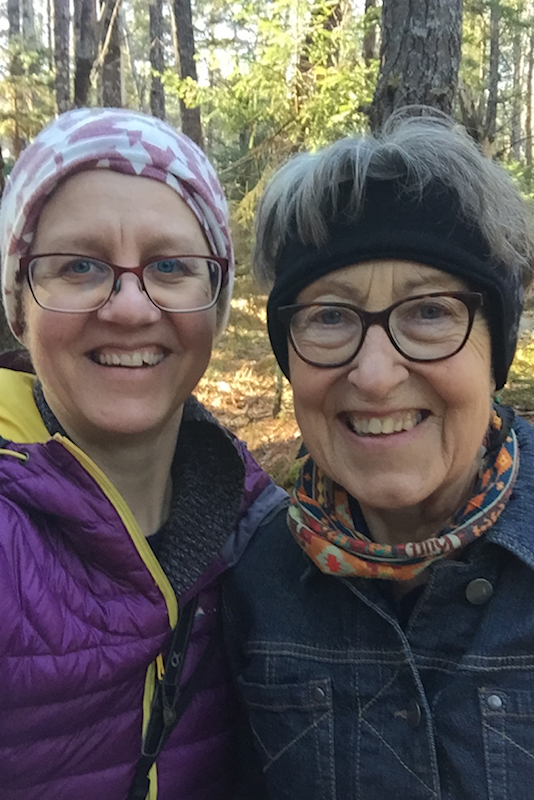
That box was pretty tight in my childhood and early teen years. So cozy, so safe.
Deconstruction is largely a process of resolving cognitive dissonance by valuing humanity more than ideology ~ Brian Peck
Growing up in a rural-ish prairie town there wasn’t a lot in my life to expand the box edges. We weren’t hicks but I hadn’t personally met a lot of people that were vastly “different” from me. Most of my circle was white, established Canadians, Christians, middle class, and straight (as far as I knew). I didn’t have a lot of brown friends, or immigrant friends, or gay friends, or Muslim friends.
As the box started to get bigger I assuaged the discomfort of my dissonance with a dichotomy of sorts that worked really well for many years.
There was one standard of living for Christians and there was another standard for non-Christians. Gays, Muslims, secular liberal university professors, general heathens, etc. all fell into the Non-Christian category. Because they didn’t know any better, God had different standards for them. I didn’t have to bear the burden of whether they were going to hell or not. God could always play his trump card and I figured he’d trump in their favour unless they were truly heinous people.
Their anti-Christian behaviour and lifestyle choices might be reprehensible, weird, or misguided, but until Jesus lived in their hearts they couldn’t really know better and my job was to love them into a relationship with Jesus.
The church figured out long ago that thumping people over the head with hell and damnation may have been a conversion strategy at one time but it wasn’t palatable in the late 20th and early 21st century. I came of age in an evangelical culture where “we loved people” into conversion.
And so this is what I did. Truthfully and honestly. This was so freeing for me and came at the perfect time as my social circle expanded to more and more people not like me.
I’m so thankful I had this strategy to help me navigate the disconnect and dissonance in my faith as I met such lovely people who enriched my life with beauty and friendship and I didn’t have to try to save them, or judge them, or convince them.
I had the freedom to love, accept, and include people exactly the way they were.
This way of processing and practicing my beliefs was influenced by Vineyard doctrine during the years we lived in New Jersey and Maine.
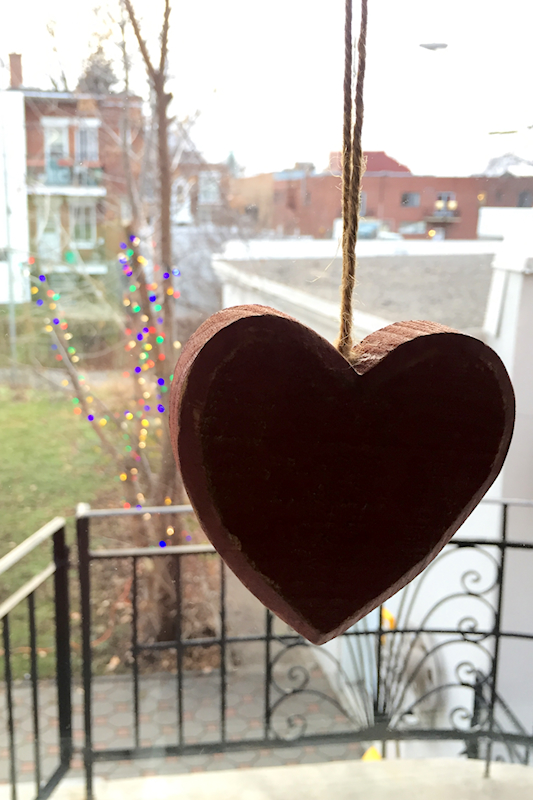
My interests and proclivities in urban gardening and community living, our family interest in the outdoors, and Damien’s relationships within the liberal arts college where he worked, opened up our social circle to college students and recent grads, introducing us to more transgender, bisexual, gay, and lesbian people than I had ever known before.
We hung out with the hippies and heathens, people who were living communally and sharing resources, growing food for their community, working to end food insecurity for low-income folks, beautifying downtown neighborhoods, and helping immigrants access resources. Our friends were invested in caring for, what Jesus called, “the least of these”. They were some of the most Christian people, in terms of action in the world, I had known.
For years I’d accepted non-Christians as they were. But I applied a different standard to people who were Christians.
In one respect, this feels completely justified to me. A professing Christian’s life should bear the marks of Jesus. If you think about this for a bit, on how Jesus’ life and body was “marked”, it’s evident this is a life of self-emptying love, of a giving and receiving that is almost the anti-thesis of many Western cultural values, beliefs, and practices.
The Church’s understanding and definition of what it means to belong to the faith, to each other, and to God has morphed over the ages. I don’t want to say “evolved” necessarily because in some cases it’s been a de-evolution. Though I’d like to believe, along with Martin Luther King, Jr. that “the arc of the moral universe is long, but it bends toward justice”. We keep bending our way there but it’s a slow go.
And as we go through these evolutions and de-evolutions and as we read the scripture through the lens of our time, culture, and context, we set standards about who is in and who is out.
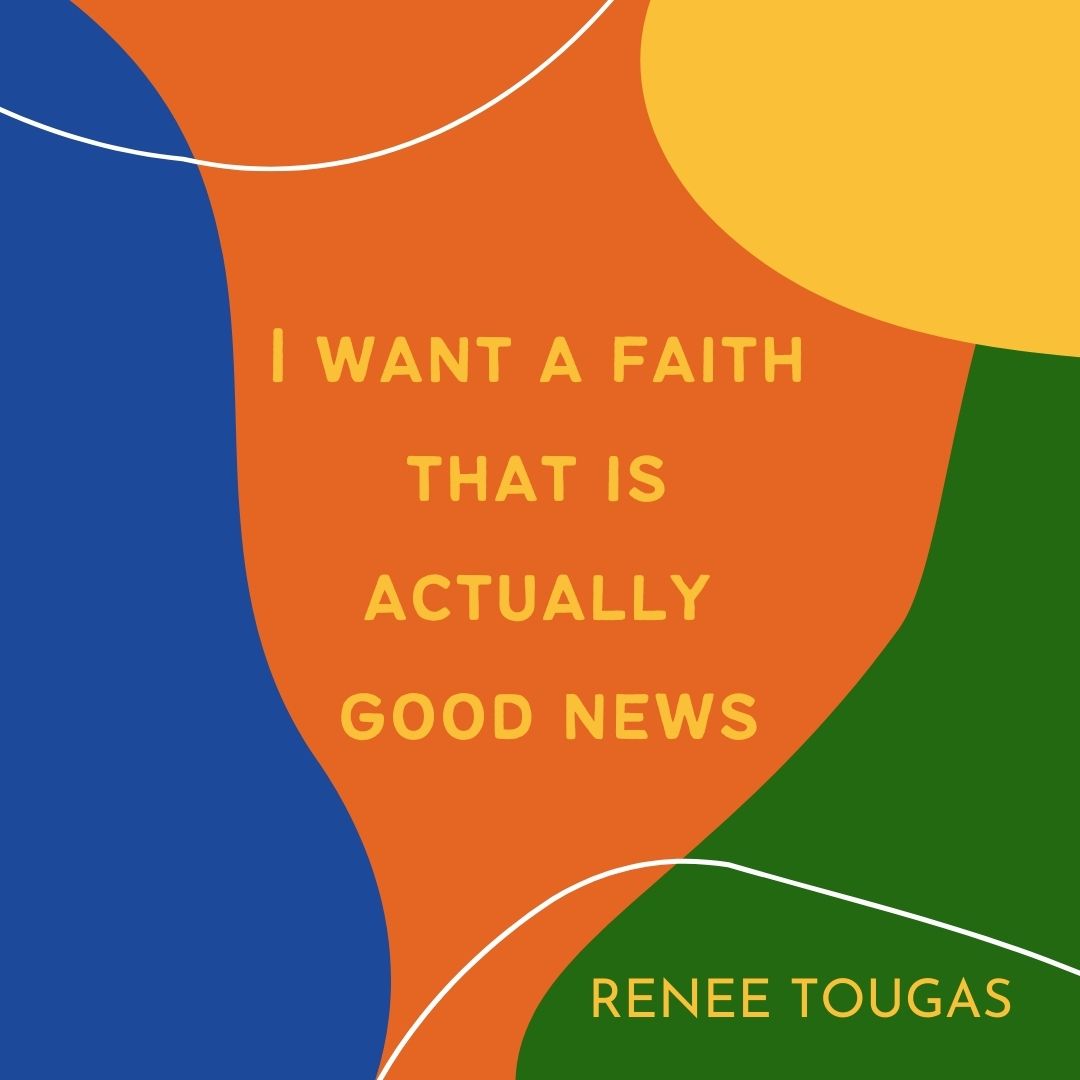
This goes back to the “good news” I was talking about earlier that we are fundamentally separated from God, but God makes a provision, through violence and bloodshed, to remedy that problem. If that’s true, then of course there are definitions of who’s in and who’s out. Who’s saved, who’s going to hell. (Which also assumes a literal afterlife hell. A whole ‘nother theological discourse I’m not going to unpack, except to say I threw that one out a while ago.)
I came from a Christian tradition with clear definitions about who was in and who was out. Who could participate fully in the life of the church, and who couldn’t. These rules have changed over time.
Women, Blacks, Indigenous, divorced people, gay people - all have been excluded from full participation and equality within the church at one time or another. And here’s the kicker: all of that can be defended with Bible verses. You can use the Bible to defend any action or position you hold. The most heinous crimes are documented in it; prejudiced, racist, and bigoted points of view have been, can, and are defended using scripture.
Christians have all the justification they need to push people to the margins, to the edges, to exclude them from belonging, right in our sacred text.
And we also have the opposite. An overarching story of what Divine action in the world really looks like.
I’ve held all of this in me for my lifetime. The exclusion, the teaching of separation juxtaposed with Jesus’ life and teaching of being one with God, and inviting us into the experience likewise. Reconciling all of this was hard and it took many years.
Thank God I'm a mother.
My experience as a mother saved my faith, or as scripture would say, gave me “eyes to see”.
I am not a Biblical scholar. I am not a theologian. There are people with way more experience than I at reading and interpreting scripture.
I don’t care that you can “nail me” with all kinds of counter-scripture and counter-theology. If it doesn’t resonate with my reality as a mother, I’m not having it.
What is my experience as a mother?
My children cannot un-belong to me with poor behavior, lifestyle choices, or even heinous actions. I would absolutely be grieved and in a lot of pain if they did horrible things to themselves and other people, but they will never not belong to me. They are always my children. And I will always be here for them. Their choices might move them “away” from me physically or relationally, but I will never disown them, they are part of me, always.
My love will always be flowing to them and not withheld from them.
As a mother, I have a tender, fleshy, life-giving belly. I’m soft and vulnerable. When this softness is threatened we hunch to protect our vulnerability with the hard spine of theological discourse and dissertation. We throw around big words and Bible verses, when it’s not words that feed us, but bread and soup.
I reached a point in wrestling with my faith where I decided that if I do in fact believe in God, God has to be at least as generous towards creation as I am towards my children (and hopefully infinitely more). If not, I’m out. Regardless of what some Bible verses say.
If being “in” meant I had to always hunch over the soft belly of Love with the hard spine of Truth, I’d rather be “out”. If being “in” means excluding some people because of a few Bible verses, again, I’d rather be “out”.
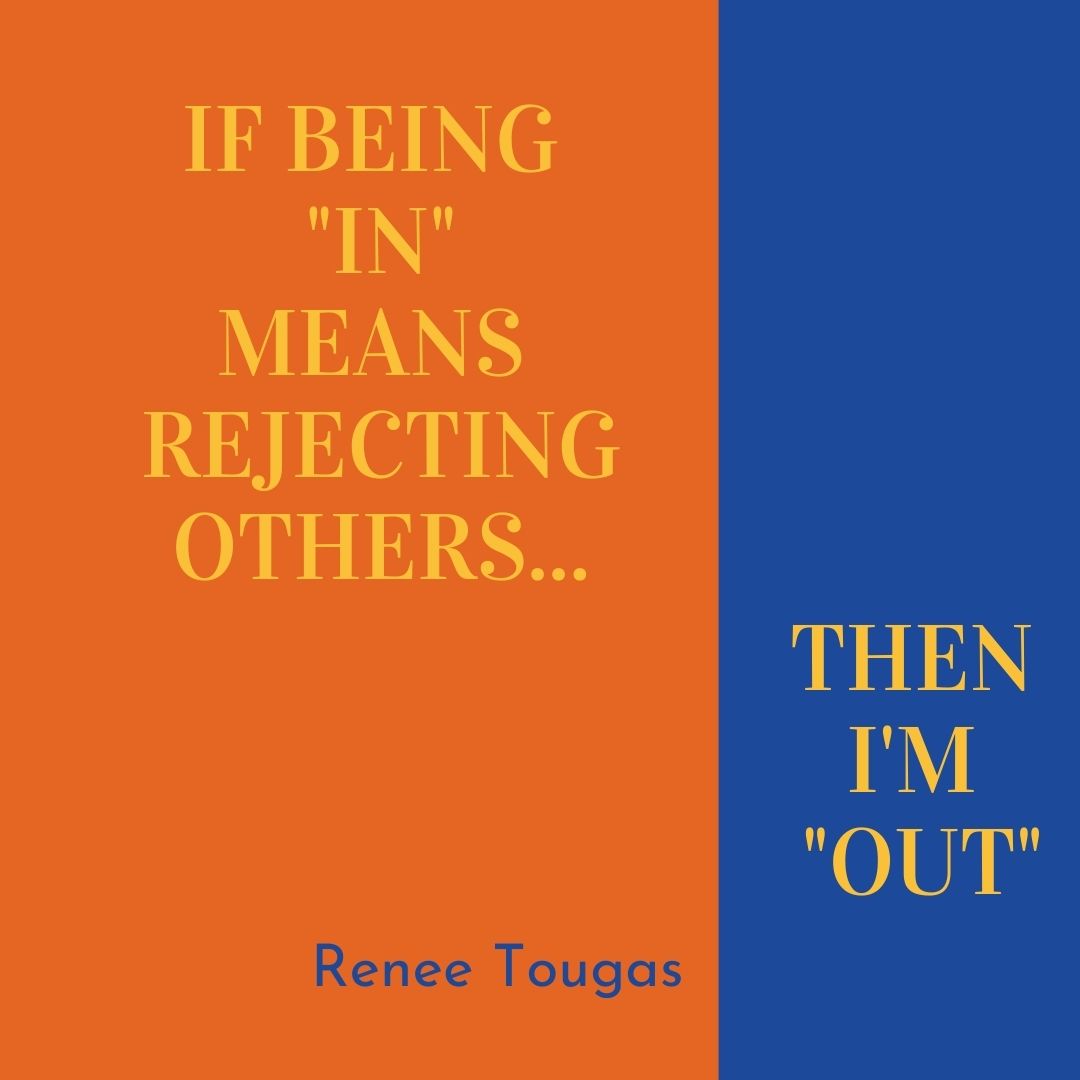
I’d rather lose religion than lose people.
As it turns out I don’t need to lose either. Because life isn’t a duality like that. And Christian theology and practice is a wide, wide tent.
Don’t get me wrong, I love a hard, solid idea. I love something concrete that I can hold on to. But when hard ideas are used to bludgeon people and sever connection, when we hold on to them to resist the flow of Love in our lives, they are not truth, they are idols.
I’ve been sold many false binaries over the years including that Love is somehow counter to Truth. Love does not counter Truth, it counters fear.
Love is highest order Truth. And Love has to lead. Just like it does when we walk upright as humans, our vulnerabilities exposed, front and center.
It’s the opposite of coming into relationships and conversations armoured and protected, fortified with all the right verses, the right thinking, the right practice.
When I deconstructed my faith I fell down a well. It was a very slippery slope alright (wink, wink). And when I hit the bottom I realized I would never be separated from the Divine. For me, beneath that dark well was a river of Life, a river of Love. And that river might carry me aways from where I started. It might even leave me bedraggled and a bit disorientated on the shore but I would never, could never, escape Love as the Ultimate Reality of existence.
My experience as a mother taught me that nothing I could do would irreparably separate me from this Love. I was always in that Love, though I might not see it. And when I can’t see it I will act in unloving ways.
Imagine being blindfolded in a room of light. The blindfold doesn’t change the existence of the light, but it absolutely changes your experience of that room. Objects are unknown and therefore threatening.
The good news now is: take off the blindfold, look where you already are, where you’ve been all along.
When I dropped into this river of Love, into this net of Ultimate Reality through which I could never fall through, I came to the awareness that we’re all here together. We’re all connected. We all belong.
Some of us are thrashing around, blinded by our fear, harming others. And then there are bright lights of wisdom that break through that fear to say “take off the blindfold, look around, see your brothers and sisters - queer, Muslim, francophone, anglophone, Hindu, Jewish, Orthodox, conservative, liberal, immigrant - what you thought is “other”, isn’t.”
We all belong. Now start treating each other that way. Jesus called this the Kingdom. The Kingdom here and now. The Kingdom to come.
A few years ago, after I’d been experiencing and processing all of this, I knew I needed to articulate it to my children.
A long road trip trapped in the car together was the perfect opportunity, seeing as everyone was captive.
I also used these road trips to play podcasts with “alternative” theology and discussions about what it meant to be a Christian. The kids were never obliged to listen but I’m sure they caught some of it.
We had just finished one of The Liturgists podcasts about “being gay in the church”. We had stopped at a US Cellular in a strip mall on the outskirts of some town in Michigan, Indiana, or Illinois so Damien could activate a US plan on our Canadian cell phone.
In this most auspicious of places, this is what I said,
Our Christian community has certain beliefs around gender, identity, and sexuality. These are not my beliefs. And I want you to hear straight from my lips - I love and accept you fully for who you are, and as you grow into adulthood and express your sexuality and meet and love people - I will celebrate who you are. And I do not believe that your gender or sexuality separates you from God (nothing separates us from God) and neither does it exclude you from full participation in Christian practice.
I don’t remember their responses but they had seen and heard my processing for a while. I don’t hide stuff. They knew where I had landed. But I still had to speak it directly to them.
You will always belong. You always have. Nothing can separate you from Love.
When I fell into the river of Love at the end of my deconstruction I decided to choose people over ideas. People over religion. People over institutions.
We should not treat Christian theology more carefully than we treat people. ~ Heather Caliri
I had already been living that way for years it just took me some time to get there in my doctrine. What’s pretty amazing is that not only did I not have to leave my faith to do this, though at one point I was totally ready to do so. But I actually had a pretty good example to follow in the story of Jesus. Imagine that!
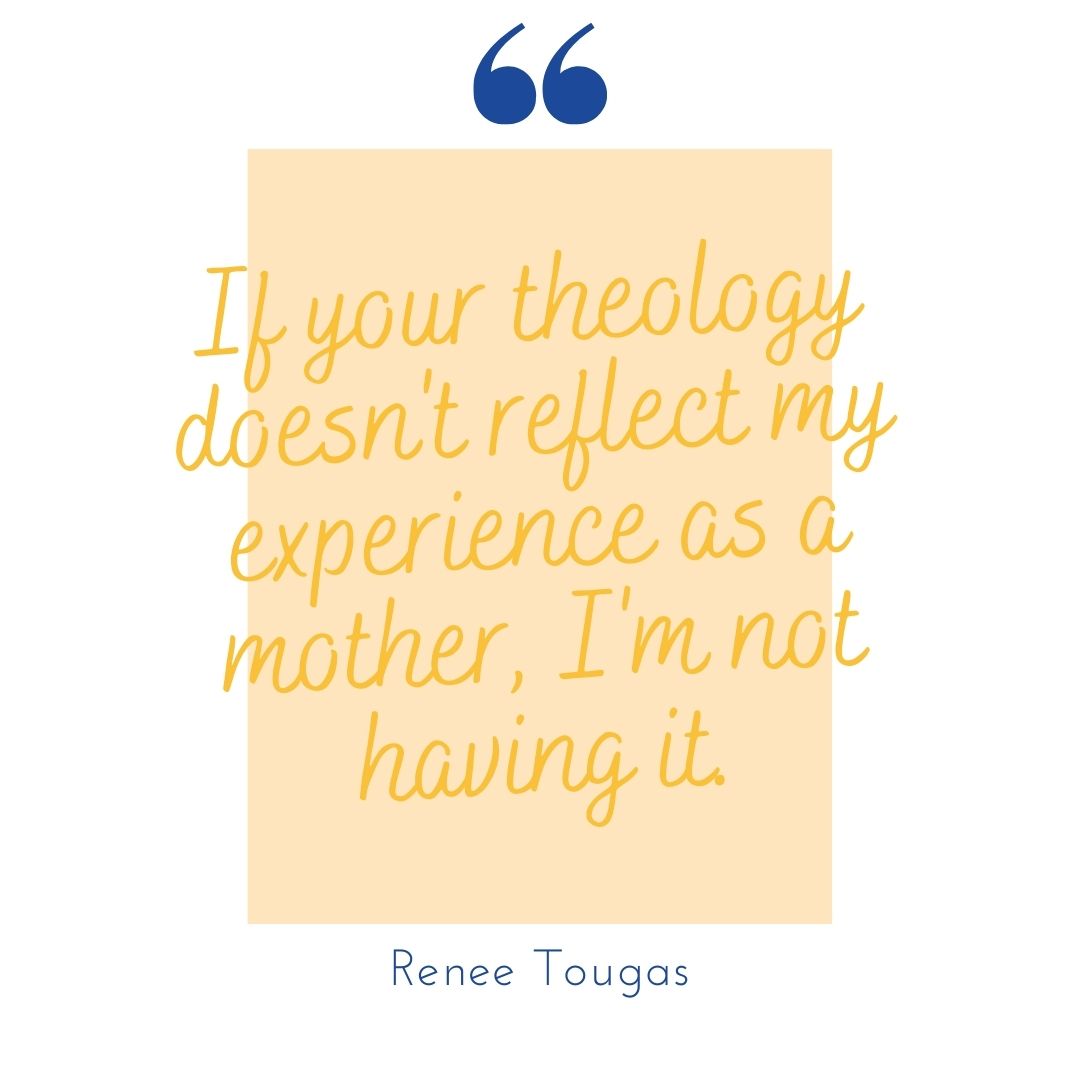
And so when my child came out, it was a celebration of who they are. In no way did it challenge or rock my faith. It did not stir up fear in my heart for her salvation or acceptance by God.
I am not ashamed of this gospel. To have this soft, tender Love exposed to the world.
These days I am finding Christian community in places where I feel assured that I won’t have to hunch to protect the soft belly of my theology. Where I can bring my mother-perspective of God without calls of heresy or just the mild suspicious side eye.
The Divine irony of these communities is the faithfulness of my queer friends to Christian practice. Their diligence to scripture and their belief in prayer puts my own practice and doubt to shame, if I carried shame or guilt around these things, which I no longer do. By many measures they have “more” faith than I do, and often more theological training.
I wish my young adult self - the one who had to hide parts of her belief in containers marked “do not open” for fear of the Pandora’s box effect upon opening, the one who didn’t know how to reconcile her experience of Love with the doctrines/teachings of her church - I wish she could see where we landed. She didn’t get to see it then. But my young adult children do.
It’s the next best thing. And it’s a good start.
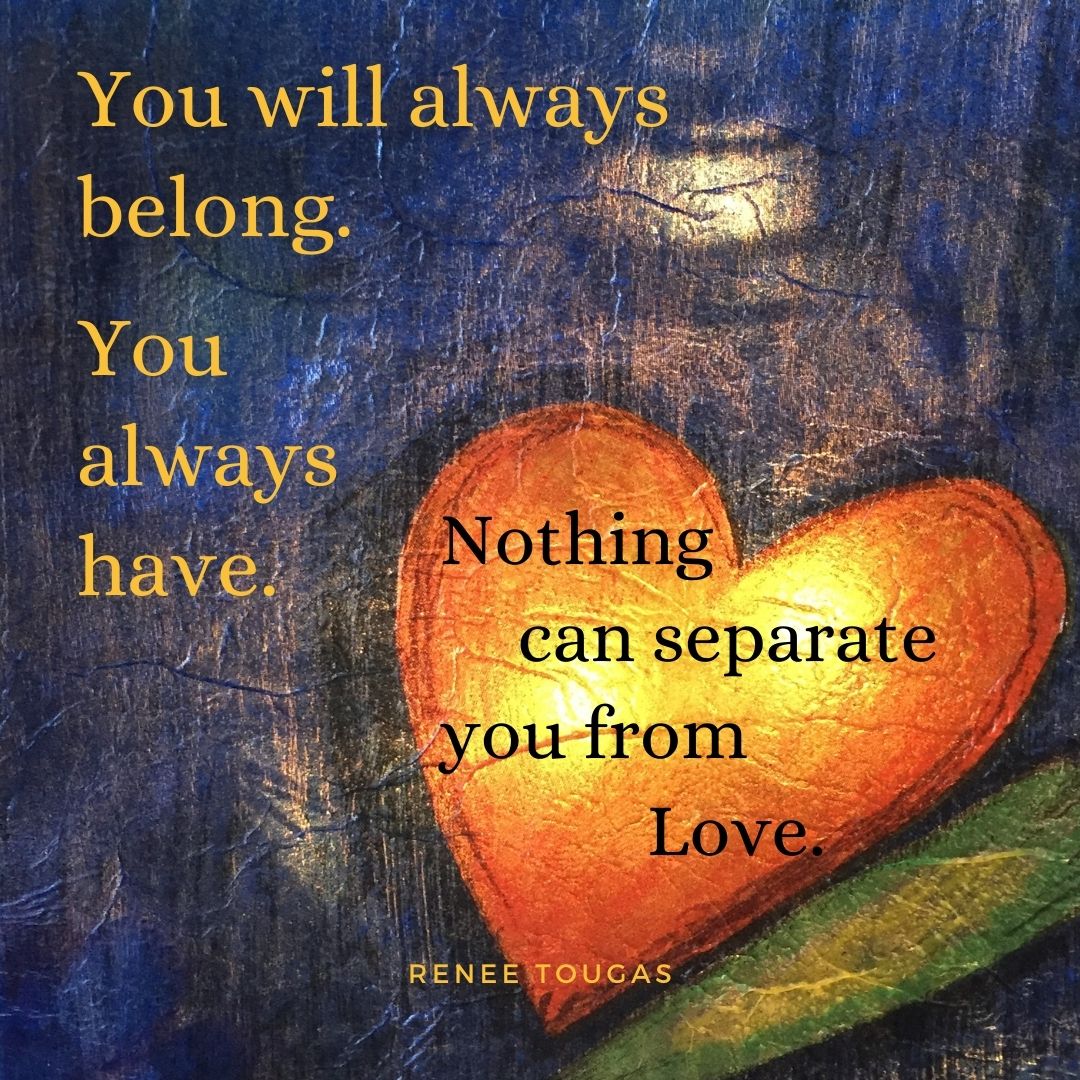
Resources
After writing this post I thought I should addd a few resources if you wanted to do some reading/listening for yourself. There are many, many resources. Too many to name here. I seem to bump into new ones each week.
To keep this simple, and actually get this post published, I’m only mentioning a few, but from these few you can find many more.
Queer Grace, An Online Encyclopedia for LGBTQ & Christian Life. - “Queer Grace is a curated encyclopedia of information and ideas around the life of LGBTQ+ people and Christian faith. We hope to offer a safe space full of resources for all those navigating their journey in the church.” Books, podcasts, supportive online communities - this is a portal for all of it.
Generous Space - A Canadian-based organization working to “dismantle religious-based harm, pursue intersectional justice, and celebrate LGBTQ2+ lives in both the church and our world.”
Why I chose my LGBTQ daughter over the Evangelical Church - TEDx talk by Susan Cottrell. We need more mother voices telling their stories.
Blue Ocean Church - I’ve been following the evolution of this Ann Arbor, MI church for years who left Vineyard USA when the denomination formally took an non-affirming and non-inclusive stance against LGBTQ+ people. Vineyard was my spiritual homebase for 11 years. Of note, Vineyard Canada recently did the same in excluding LGBTQ+ folks from full participation in church life. Montreal Vineyard, one of the churches I am associated with, does not align with this official stance.
Another community I’ve followed for many years, the St. Croix Church in St. Stephens New Brunswick, has also left official Vineyard association because of this. A thriving, charismatic, social justice orientated, Bible-teaching, affirming church in rural NB, associated with a small LGBTQ+ affirming Christian liberal arts University in the same town, is almost enough to make me want to move to New Brunswick!
Anything by Brad Jersak - so this link doesn’t send you to a book, podcast or resource specifically dealing with LGBTQ+ issues. This link is for general theology.
I came to a new understanding of Christian faith and practice through my heart and personal experience, not by parsing scripture. (Richard Rohr’s work at the Center for Action and Contemplation was deeply influential.) But as a deep thinker, I love theology and heady discussions about how to know and understand God.
When I was ready to chunk theology out the window entirely because of how my inherited theology was one of an angry and wrathful God killing his own child, it was the teaching of Brad Jersak, Brian Zhand, Stephen Backhouse and others pastors, theologians, and scholars that showed me I could still call myself a Christian and that robust theology existed in Protestant places outside the circles I knew.
Personally, I have needed theologians who come from own tradition and have some shared life experience, including my Canadian evangelical context, to lead me out of that tradition into new ways of being Christian.
I get that the mainline protestant churches were arriving at more inclusive theology and practice years ago. But I grew up in a tradition that doubted that mainline church attenders were even “Christian”, so I had a lot of inherited bias to overcome.
Brad Jersak is one of the scholars whose teaching affirms that my perspective firmly belongs in Christian practice and belief. I haven’t read any of this books but I learned so much from every podcast episode I’ve listened to that features him (and there are many). Start with this somewhat recent episode from Ideas Digest (which speaks to my experience of the different ways we know truth, and affirms my mother-experience as a source of Divine wisdom) and pair it with this episode from Tent Theology to get a good introduction to Jersak’s theology.
To be clear: I’m not as theologically-inclined as these teachers, I’m doubtful about creeds, I don’t believe everything they espouse - but their understanding of Christianity makes generous space for my Christian practice and the practice of my LGBTQ+ friends and family.
Filed Under
Part of Series
You can subscribe to comments on this article using this form.
If you have already commented on this article, you do not need to do this, as you were automatically subscribed.
